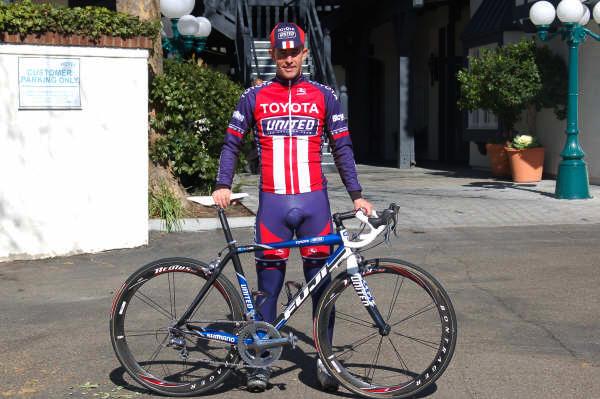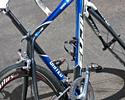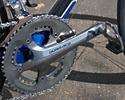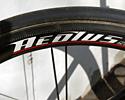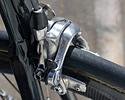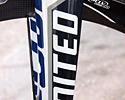
Recently on Cyclingnews.com |
Pro bikes, March 31, 2007
Hilton Clarke's Toyota-United Fuji SL1
Simply betterBy Kirsten Robbins After a three-year jaunt on a Colnago with the Navigators Professional Cycling team, Australian sprinter Hilton Clarke joined the Toyota-United squad and their team issued Fuji SL1 machines. Set up for a successful season, Hilton aims at improving on his palmares of over 30 career victories that include podiums in his native country's Bay Crit Series, the CSC Invitational and his most prized win in the 2006 USPRO criterium championship at Downers Grove. Toyota-United hopped on the carbon fiber bandwagon two years ago when it swapped its own brand of aluminum-and-carbon rigs for the all-carbon SL1 of new sponsor Fuji. At a claimed sub-900g, the monocoque SL1 frame is markedly lighter than the team's old bikes but also supposedly stiffer with its Energy Transfer Chainstays, a characteristic particularly important to a sprinter like Hilton Clarke. "This is the first time I've ridden a Fuji and I really like it," said Clarke. "The moment that I signed with the team, Fuji Australia sent me an SL1 to get used to it and I did the [Bay Crit] Series on it. That series was really technical with a lot of corners and I felt great and really responsive on the Fuji." "It feels strong and light on the climbs and I especially like descending on it and the way it feels through the corners," continued Clarke who prefers a stiff frame not only for sprinting but also for better handling on the fast and technical circuits American racing is most famous for. "It feels really strong. The sloping makes it a small, compact frame. There isn't enough room for it to flex because of that. I did well in the start of the season and I hadn't done too much training on it prior so it was easy to adapt to." Clarke's bike is fitted with a fairly standard build which includes the ubiquitous Shimano Dura-Ace gruppo. Bontrager also supplies a wide range of parts including wheelsets, handlebars, stems and seatposts. Fi'zi:k equips Clarke with its Arione saddle and Vittoria provides the tubular rubber. Total bike weight is just 7.1kg (15.7lb) complete with relatively deep Aeolus 5.0 wheels and Fuji's matching FC-330 carbon fork. Switching over to the Shimano Dura-Ace SPD-SL pedals caught Clarke's attention after his lengthy six-year term with Speed Play, though. "This year I am using Dura-Ace, which I was a little worried about at first because I had been on Speedplay for so long but I seemed to have adapted to them straight away. The Dura-Ace pedals have a lateral movement and I didn't know how that was going to work but I've felt great on them." Although the build kit is fairly standard, Clarke's front end setup is anything but as evidenced by the rather severe downward tilt of his handlebars. "I rotate my handlebars down so I can be in the drops and I can grab the brakes a lot easier and I don't have to effectively change my position when I'm sprinting," he said. The position is hardly just a matter of personal preference, either, as the winning sprinter consulted a position specialist in Melbourne, Australia to help him find the perfect fit on his bike. "I guess to some people, riding the hoods twisted around a little might be a bit uncomfortable but I'm used to it and I'd rather sacrifice that little bit of discomfort so that I can have a good sprint at the end." His revamped position also includes more saddle setback than he had on his previous year's Colnago. "I was injured last year and I saw a specialist named John Kennedy at home who helped me a lot," said Clarke who believes to have lost his correct position over the years after so many bike changes. "I was having problems with my pelvis so we put my seat up and back a bit." Clarke is just one of a multitude of sprinters assembled on the Toyota-United squad who will kick off the NRC season in Redlands, California in early April. After the team's serious bout of illness during the early stages of the Tour of California, the squad will be looking to reaffirm their strength in the American peloton in a mad dash to the line.
| |||||
Full specificationFrame: Fuji SL1 Critical measurements Front brake: Shimano Dura-Ace BR-7800 |
Wheelset: Bontrager Aeolus 5.0 tubular 5.0 (race), Bontrager
Classics clinchers (training) Bars: Bontrager Race Lite VR, 42cm (c-c) Pedals: Shimano Dura-Ace SPD-SL PD-7810 Total bike weight: 7.1kg (15.7lb) | ||||

